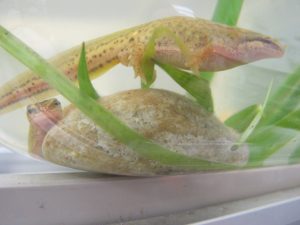We offer a Research Project Course (RPC) on amphibians and pesticides as part of the project “Amphibians in agricultural landscapes: chemical landscape fragmentation implemented in a habitat modelling approach”.
Amphibians are among the most endangered vertebrate classes and over 37% of all amphibian species are endangered to some degree. Within the project lead by Kathrin Theissinger, we investigate the effect of pesticides, one of the main drivers of global amphibian declines, on amphibians on the individual as well as on the population level.
Most native amphibians need aquatic habitats for reproduction. As over 50% of the area of Germany is used for agriculture, such habitats can often be found within the agricultural landscape. Consequently, their aquatic habitats are often contaminated with pesticides, resulting in exposure of adult amphibians and their larvae. Several studies have shown that pesticides can negatively affect amphibians, so it might be advantageous to choose reproduction ponds with a low level of contamination.
In the scope of a RPC, you will conduct a habitat choice experiment with female palmate newts (Lissotriton helveticus) in the laboratory to find out if amphibians can discriminate between water bodies with or without pesticides. Palmate newts usually wrap their eggs on aquatic plants to protect them from predation and environmental influences. In addition to the actual choice (water with/without contamination), you will investigate if the presence of pesticides influences this egg-wrapping-behaviour.
The work will be conducted from March to the end of April 2018 at the Geilweilerhof in Siebeldingen near Landau. Independent and accurate work is expected. Laboratory experience and sound statistical understanding are a requirement. Experience in working with amphibians is an advantage.
If you are interested please contact us for more information on the project:
Christoph Leeb (leeb@uni-landau.de) and Kathrin Theissinger (theissinger@uni-landau.de)

